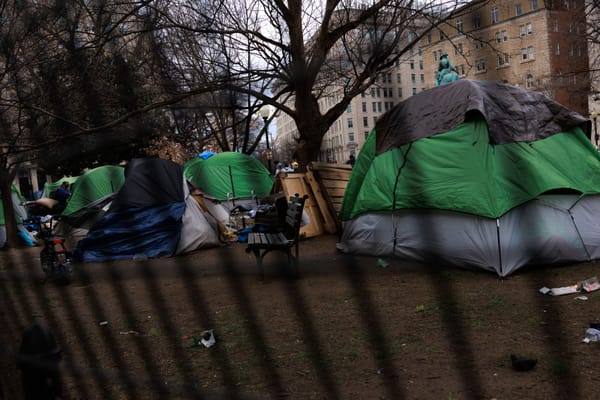Social-services nonprofits exist, in theory, to help the poor. They also provide their employees with jobs, which those employees naturally desire to keep. If the problem the organization is tasked with “solving” goes away, so do those jobs. That is the nature of social work. It isn’t an indictment of social work, much less social workers. All sorts of businesses, from auto-repair shops to funeral homes, profit from other people’s misfortune. The financial incentives in the social-services industry are such that, oftentimes, dysfunction is good for the bottom line.
The growth of the homelessness-industrial complex—the network of nonprofits and clinics that provide housing, medical, and mental-health services to America’s homeless population—illustrates the principle. The philosophy guiding these organizations, known as Housing First, calls for providing the homeless with homes and amenities, no strings attached. In effect, this enables the very behaviors and pathologies that rendered their clients homeless in the first place, and—not coincidentally—tends to grow the client base for the nonprofits.
Georgia Gov. Brian Kemp and the state’s Republican-controlled legislature are attempting to disrupt the homelessness-industrial complex by changing the incentives according to which it operates. Senate Bill 62, signed into law by Kemp in May and based on model legislation from the Cicero Institute, requires localities to enforce camping ordinances and calls for an audit of the nonprofits that provide services to the state’s homeless, measuring their performance in actually reducing homelessness in the communities they serve.
The bill directs the state auditor to review the performance of state- and city-funded homeless programs, and the extent to which contractors and grantees succeeded by the metrics contained in their contract or grant, respectively. The governor and the legislature will be made aware of the groups that failed to meet the terms of their contracts or otherwise underperformed relative to other social-services providers across the Peach State.
“These measures may not sound radical, but they are.”
These measures may not sound radical, but they are. For decades, social-services providers have siphoned money from Georgia’s state and local governments with little accountability, variously advocating and implementing policies that exacerbate the problems they are tasked with solving.
The CEO of the nonprofit Atlanta Harm Reduction Coalition, for example, called in 2020 for the state to legalize supervised injection sites, which would allow addicts to use illegal drugs under medical supervision. Members of Legal Aid Atlanta, which receives grant funding from the state’s Department of Human Services, have supported the downsizing of state-operated institutions for people with serious mental illness.
Georgia’s homelessness crisis hasn’t reached California levels of anarchy. Georgia ranks 29th among all states in homeless residents per capita, and cut its homelessness rate nearly in half over the past two decades. Since 2020, however, homelessness is up about 4 percent statewide, which prompted the state to convene a task force to study the problem. The task force, whose recommendations were critical to the eventual passage of Senate Bill 62, revealed evidence, perhaps unintentionally, of waste and mismanagement in its homeless-services system. One appointee on the task force, Cathryn Marchman-Vassell, CEO of Partners of Care, noted that her organization had 500 housing units in development. Each unit, conceived as part of the group’s Housing First philosophy, costs about $40,000 to build.
Taxpayers would consequently be sinking some $20 million into no-strings-attached living units for the homeless. Later in the task force’s final report, fellow appointee Judge Glock of the Cicero Institute observed that 50 percent of Georgia’s shelter beds go unused. In other words, tens of thousands of homeless people in Georgia are declining to use shelters the state has already made available, even as the state commits potentially millions of dollars to build even more housing units that could draw yet more homeless people to the state.
The task force also commissioned a study on the composition of the state’s homeless population. Surveying more than 25,000 homeless Georgians, they found that, in a state that last year spent $62 million to fight homelessness, more than half of those surveyed were unsheltered.
In Atlanta, where a more granular study was commissioned, the task force found that of the city’s 3,240 unhoused people, 740 suffered from serious mental illness, and 639 had a substance-abuse disorder. Those figures illustrate that Georgia’s homelessness problem, like that of other states, involves the evil convergence of housing shortages, poverty, crime, drug abuse, and untreated serious mental illness.
To find a stable solution, Georgia and other states must ensure that state-funded social-services groups aren’t perpetuating the problems they are being paid to solve. That requires aligning the incentives of the providers with the intentions of the government and the demands of justice—that homelessness be eliminated, not enabled. On that score, Senate Bill 26 is a much-needed step in the right direction.
